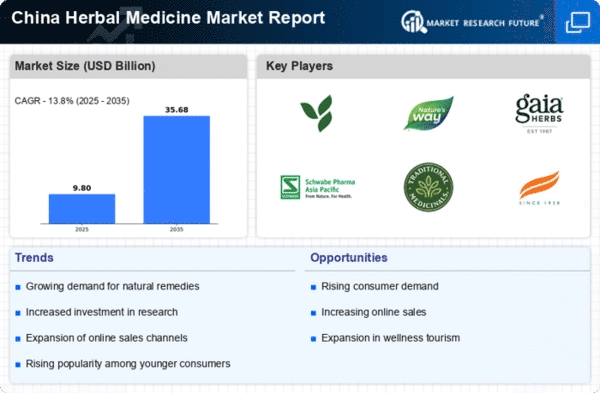E-commerce Expansion
The rapid expansion of e-commerce platforms in China has transformed the way consumers access herbal products, significantly impacting the herbal medicine market. With the rise of online shopping, consumers now have greater convenience and variety when purchasing herbal remedies. Recent data suggests that online sales of herbal products have increased by over 30% in the past year, reflecting a shift in consumer behavior. The herbal medicine market is capitalizing on this trend by enhancing online presence and offering direct-to-consumer sales. This shift not only broadens market reach but also allows for better consumer engagement through targeted marketing strategies. As e-commerce continues to grow, the herbal medicine market is likely to see sustained growth, driven by the increasing preference for online shopping among health-conscious consumers.
Growing Consumer Awareness
The herbal medicine market in China experiences a notable surge in consumer awareness regarding health and wellness. As individuals increasingly seek natural alternatives to conventional pharmaceuticals, the demand for herbal products rises. This shift is reflected in a 15% increase in sales of herbal supplements over the past year. Consumers are becoming more informed about the benefits of herbal remedies, leading to a greater willingness to invest in these products. The herbal medicine market is thus positioned to capitalize on this trend, as educational campaigns and social media influence further enhance public knowledge. This growing awareness not only drives sales but also encourages manufacturers to innovate and diversify their product offerings, ensuring that they meet the evolving preferences of health-conscious consumers.
Increasing Health Consciousness
In recent years, there has been a marked increase in health consciousness among the Chinese population, significantly impacting the herbal medicine market. As individuals prioritize preventive healthcare and holistic wellness, the demand for herbal products has surged. Reports indicate that the herbal medicine market has witnessed a growth rate of approximately 20% annually, driven by consumers seeking natural solutions for health maintenance. This trend is further supported by a growing body of research highlighting the efficacy of various herbal ingredients. Consequently, manufacturers are responding by expanding their product lines to include a wider array of herbal supplements and remedies. This increasing health consciousness not only fuels market growth but also encourages innovation within the herbal medicine market, as companies strive to meet the diverse needs of health-focused consumers.
Regulatory Support for Herbal Products
The regulatory landscape surrounding herbal products in China is evolving, providing a supportive environment for the herbal medicine market. Recent government initiatives aimed at promoting traditional medicine have led to clearer guidelines and standards for herbal products. This regulatory support enhances consumer confidence in the safety and efficacy of herbal remedies, which is crucial for market growth. The herbal medicine market is likely to benefit from these developments, as manufacturers are encouraged to comply with regulations that ensure product quality. Furthermore, the government's endorsement of herbal medicine as a viable healthcare option may lead to increased funding for research and development. As a result, the herbal medicine market is poised for growth, driven by a favorable regulatory framework that supports innovation and consumer trust.
Cultural Heritage and Traditional Practices
The rich cultural heritage of herbal medicine in China plays a pivotal role in shaping the herbal medicine market. Traditional practices, deeply rooted in Chinese history, continue to influence consumer preferences. The herbal medicine market benefits from this cultural significance, as many consumers view herbal remedies as integral to their health and wellness routines. Recent surveys indicate that approximately 60% of the population regularly uses herbal products, reflecting a strong connection to traditional healing methods. This enduring cultural relevance not only sustains demand but also fosters a sense of trust in herbal remedies, encouraging new generations to embrace these practices. As a result, the herbal medicine market is likely to see sustained growth driven by cultural appreciation and the desire to maintain traditional health practices.













Leave a Comment